For over 90 years, the Fellowship of Independent Evangelical Churches (FIEC) has encouraged and equipped local churches to go and make disciples for Jesus Christ in every community of our nation. These churches share a common ecclesiology, which they believe is thoroughly Biblical and therefore most effective to supporting and advancing gospel ministry.
This resource, written by some of the leading Pastor–Theologians of the FIEC, explains the theology, history, practice and vision of Independent churches. It will help those outside the FIEC to understand our identity and purpose, and overcome some common misunderstandings about Independency. It will inspire those within FIEC, and in other Independent churches, to have confidence in our ecclesiological convictions, and urge us to work together even more effectively if we are to meet the massive missionary challenges of post–Christian Britain.
"Finding ‘Independent Church’ by @theFIEC a very informative and compelling read. Great gospel vision! Thanks @10ofthose for speedy delivery!"— Graeme Shanks (@gshanks111)
August 1, 2015
-
Title
Independent Church
-
ISBN
9781909611658
-
Format
Paperback
-
Publisher
-
Topic
Church
-
Audience
Adults, Church Leaders
-
Pages
352
-
Published
04/11/2014


